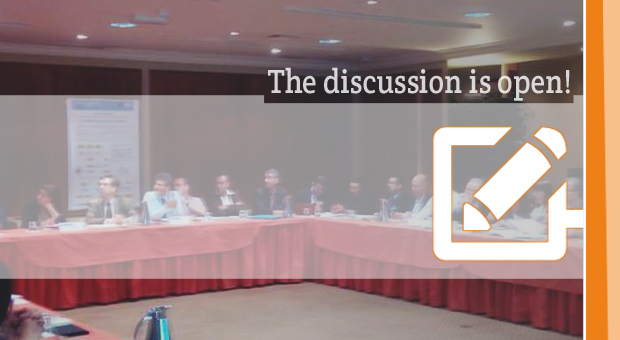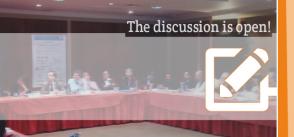
Express your opinion on the EMEG position paper!
On the ground of the results obtained through the Open Consultation and of the discussion held during the Meeting in Lisbon (June, 20th-21st), The EMEG group produced a position paper which presents the reccommendations for the Euro-Mediterranean research agenda.
You can read an extract of the position paper here or download the entire document (pdf).
In continuation with the participative approach that we adopted to reach this outcome (notably, the Open Consultation and the digital interaction during the meeting in Lisbon), we invite you to express your comments on this position paper and to discuss with the EMEG group its content. You will find the instruments to comment and discuss at the end of this page.
EMEG Position Paper: Reccomendations for the Euro-Mediterraean research agenda (an outline of outcomes of 1st EMEG meeting)
1. Research results, solutions and market opportunities to enhance competitive Euro-Mediterranean research in MedSpring societal challenges.
During its first meeting, EMEG identified research topics and niches that more than others would enhance market opportunities, having potential for new jobs, start-ups and winning public-private-societal partnerships in relation to the above societal challenges.

EMEG agrees that most of efforts in resource efficiency should focus on water. The latter being indispensable for the conservation of all other natural resources.
A sound management of water should not only contribute to environmental sustainability and ecosystem services but should also constitutes an opportunity for new jobs, start-up and market opening. Water scarcity areas should not be seen as a problem but as a market opportunity for developing new technologies and enhancing water innovation.
The following topics are favorable in the Mediterranean for the uptake of research results and development of market opportunities:
- Management of surface-ground water resources under scarcity and uncertain conditions (quality and quantity) with a link to extreme events.
- Improvement of agricultural water use efficiency.
- Non conventional water treatment and reuse.
In particular, competitive research in above topics is a real opportunity for marketable results and solutions in the following specific sectors:
- Tools and devices based on ICT and wireless sensors for monitoring, water allocation control, remote controlled irrigation, automation and information /dissemination to end-users.
- Technologies for ground water de-pollution, irrigation water management and compact water treatment units for decentralized systems and reuse.
- Advanced oxidation process, nanotechnology and materials, filtration, artificial recharge and new anti- fouling membrane.
- Expert service under the form of local consultancy providing institutional capacity building, developing guidelines and strategies for water management
In order to ensure successful uptake of research results and impact (jobs, market and other opportunities), the design of research in above water topics and for identified solutions should be supported by a competitive public-private-societal partnerships, composed by:
- Farmers (and association/groups of farmers), as they are the end-users affected by extreme events but also acting as empowered private sector / investor.
- Water User Association (WUAs), as they are in charge for Operation & Maintenance activities
- Local municipalities
- Local municipalities and water user associations
- Private investors and tech-driven SMEs
- Basin authorities
- NGOs
- Academia and research centers
The different partnerships actors should equally share and participate in the design and implementation of research.

The main focus is to valorize and give impulse to the socio-economic development of rural areas, particularly those falling in the arid and semi-arid domain of the Mediterranean region. An increase of sustainable agriculture practices in these areas would decrease migration of local communities while preserving cultural heritage and local natural resources.
The following topics are found favorable for the uptake of research results and development of market opportunities in this area:
- Promoting sustainability in agriculture in the Mediterranean region taking into account traditional agriculture, innovative technologies, organic farming for the empowerment of rural communities.
Policies and governance to integrate technologies with traditional food production systems, promoting food safety and security.
Innovation in local Mediterranean food chains.
In order to ensure market opening, competitiveness and job opportunities, the following results and solutions should frame the research in above topics:
Innovative precision agricultural technologies in all food value-chain and efficient resources management.
Food-chain logistics reducing food lost and waste.
Quality schemes certifications via participatory approach / group certification.
Pre and post-harvest pathogens control.
Local biodiversity to adapt to climate change and enhance competitive local traditional food and on-site awareness / training courses and schools.
Long shelf life techniques.
Bio-districts to boost rural economy for creating new jobs.
The above solutions are also the opportunity for the setup of public-private-societal partnerships involving, along the all research process cycle, the following actors:
Farmers and food producers.
Food and biotech industry / SMEs.
Academia and research centers.
Investors (i.e.: ethical groups of buyers).
Policy makers and local authorities.
Women associations.

The Energy picture in the Mediterranean areas is relatively different in the northern and southern zones. Climatic, geographic and demographic characteristics are different among North and South and must be taken into account when defining common topics and solutions. Also market opportunities and level of partnerships differ very much from north to south Mediterranean.
In the South, the real opportunities for development and creation of jobs lay on the large number of small communities in remote locations, of various sizes, making connection to the conventional electricity grids difficult or very expensive. This leads to the need for the development of decentralised, local, integrated, sustainable solutions for energy production based on appropriate renewable and hybrid energy solutions, including smart micro-grids, power production and storage. These solutions would also constitute interesting market and development opportunity in remote or decentralised communities in southern Europe, including small islands, where supply and demand must be balanced through smart management techniques.
Three major topics/niches can be extrapolated:
System integration: system hybridization and integration (renewable energy, decentralized solutions).
Energy efficiency in sustainable and smart communities/districts under Mediterranean climate and uses, including raising awareness and considering sustainable participation / involvement of industry.
Solar energy, storage and smart micro grid (CSP, PV, CPV, thermal)
The above two topics will create business opportunities for a host of players in decentralized communities, including:
Manufacturers of RES equipment and integrated systems, including energy management and monitoring systems.
ESCOs and energy suppliers.
Local manufacturers of special solar components.
Building designers and consultancy firms.
Recycling firms.
This shall also create opportunities for training and awareness raising, addressing social issues and promoting acceptance by the population, involving:
Research and training institutions.
Consumer associations.
NGOs.
Utilities.
Local authorities.
Mobility (e.g., through the production and use of biofuels and other renewable alternatives) and industry also need to be addressed. Most of the population lives, however, in cities and developed areas with strong cultural traditions. The aim here would be to promote the penetration of decentralised grid-connected renewable energy sources, namely PV and CSP. This will require the development of special components and technologies based on local resources, using known mature technologies, including affordable storage solutions.
This will create market opportunities for, among others:
• SMEs.
• Local entities, e.g., NGO’s and Government (regulations, awareness campaigns).
• Training institutions for developing the skills of professionals and young people.
• Building designers.

Barriers and actions in relation to the uptake of research results were discussed by EMEG accounting the following main categories: i) Networking & Communication, ii) Management & Institutional responsibility, iii) Resources (financial / human) & Capacity, iv) Responsiveness to societal and users’ needs. Only three barriers and actions have been chosen among several other discussed and identified by EMEG and Open Consultation.
2.1 Main barriers
Networking & Communication
Lack of knowledge and poor accessibility of end users to information/research results.
Use of inappropriate communication methods, media and languages to disseminate research results.
Week interaction between academia, industry/SMEs and final users.
Management & Institutional responsibility
Conservative research policies, restrictions, no updated regulations.
Lack of integrated financial support to the whole research cycle
Lack of bridging between policy, research, industry and society
Resources (financial/human) & Capacity
Fragmentation of research topics
Research/project staff not enough trained in research administration.
Bureaucratic burdens that make project management a difficult and time-consuming exercise.
Responsiveness to users’ needs
- Research is not dealing with concrete problems on the ground, not providing concrete solutions to final users problems.
- Lacks of beneficiary and target group involvement in research design.
- Insufficient demand for utilization of research results from SMEs.
2.2. Suggested actions
Networking & Communication
Creating clusters of research organizations (institutionalized links with end-users, Mediterranean technology platform linked to topics) and thematic workshops.
Promoting staff exchange, mobility programs (intra/inter research institutions), shared laboratory facilities and databases (e.g.: EuroMed Grid).
Increasing technology awareness, communication and dissemination using ICT tools (mobiles, media, WEB) as well as through social campaign. Make WI-FI and internet affordable for all.
Management & Institutional responsibility
Decentralizing programs at local level to be closer to the field needs
Promoting methods for multi-disciplinary stakeholders involvement and ownership (e.g.: participatory
planning process, adopted method plans, study cases)
Promoting advocacy addressed to national governments to create a tax system enabling research for SMEs.
Resources (financial/human) & Capacity
Coaching of young researchers and experts to ensure knowledge share and consultancy services.
Providing travel grants for young scientists to prepare collaborative research proposals.
Providing financial support for development of IP (intellectual property).
Responsiveness to users’ needs
Enhancing ICT and DSS solutions that respond to transparency and research-society mutual trust in resources management.
Facilitating development and empowerment of rural community as well as marginalized groups (e.g.: women) through awareness, support systems, dialogue.
Encouraging SMEs in research projects providing ad hoc research modules for start-ups.

The range of topics and solutions proposed by EMEG in Sections 3 can be condensed in the following three overarching recommendations (but also paradigms) for each societal challenge:
Resources efficiency - Water:
“Managing water resources under scarcity, pollution and uncertain conditions while improving agricultural water use efficiency as well as treatment and re-use of non-conventional water”
High quality affordable food:
“Integrated development and rehabilitation of rural arid and semi-arid areas capitalizing on sustainable agriculture including traditional and organic farming, empowering rural communities and valorizing agricultural resources”
Energy:
“Capitalizing on local large availability of solar energy, by developing adapted packages of solutions for sustainable remote communities, both in terms of supply and demand, in addition to promoting the well integrated penetration of renewable energy solutions in the inhabited areas, while taking into account local cultural heritage”.







